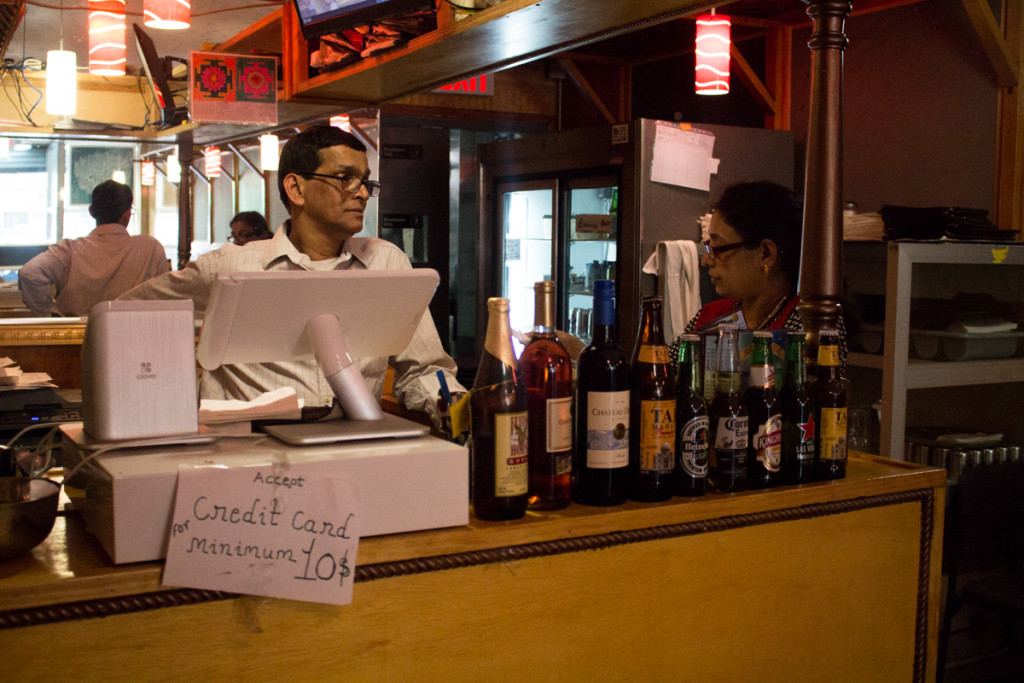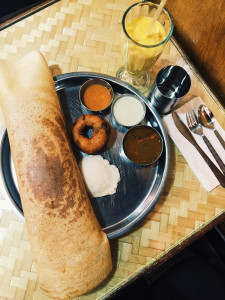Samudra Restaurant is about 19 months shy of its four-year anniversary, a milestone that marks what Jagdish Shetty and his wife, Vishala, say are the most difficult years of operating a new business. Their rent, which rises at about three percent each year, makes it difficult to keep doors open, but Jagdish, 56, hasn’t given up on his dream just yet. The restaurant, minutes away from the 74th Street subway stop in Jackson Heights, Queens, is vegetarian and offers Indian cuisine from both the south and the north.
Samudra is a narrow 45-seat restaurant on a busy road parallel to Roosevelt Avenue, with some of the décor left over from the previous tenant, a chicken restaurant. An upbeat soundtrack from Indian movies plays in the background, and the most popular item on the menu is dosa— a crepe made from rice and lentil flour that can be stuffed with toppings and is served with three types of chutney: coconut, tomato, and sambar, or mixed vegetable. Only coconut and sambar chutneys are offered in India, but Jagdish, whose manner mirrors the busy pace of Roosevelt Avenue on a weekday afternoon, says that most Americans enjoy a variety, so he offers a third option, too.
About 70 to 80 customers eat here every day, many of whom come from Brooklyn and Manhattan, according to Jagdish. While he says that many Indians have left Jackson Heights for other neighborhoods, his restaurant has a stable non-Indian clientele as well, so he doesn’t depend on them for stability. Lunchtime used to be busier, Jagdish said, but months after his restaurant opened, a commercial building nearby burned down, and he lost lunch customers who used to work there.
Jagdish came to the U.S. about 30 years ago because, he said, “everybody like[s] to see America.” He had worked as a catering supervisor in Jordan, and he has operated a food stall during India’s Independence Day celebration in New York City for many years. He’s also worked in the hotel industry, and he still does when he’s not at the restaurant—usually a four-day week at a midtown Manhattan hotel, and a couple of hours every day at Samudra. It can be difficult; on his days off, he sometimes has to work at the restaurant. “No rest,” he said.
Back in India, Jagdish’s entire family was involved in the restaurant and hotel industry, and he used to work at his uncle’s restaurant. “I was thinking, one day I want to do my own restaurant here,” he said. He didn’t go for it right away because he wasn’t completely sure: “I was thinking the [hotel] job is better than business, business have too much headache.” When his brother called to tell him about the Jackson Heights site, though, he jumped at the opportunity and made an offer that same day.
Vishala, in her calm manner, recalls her husband’s ambitions: “He’s always dreaming, ‘Oh, I want to open a restaurant, I want to open a restaurant,’” she said. Yet, it’s not easy work. “Every day, I’m coming. It’s tiring. Seven days,” she said. While she doesn’t cook at the restaurant, Vishala does whatever needs to be done in the front of house, such as taking orders from customers and serving food. The Shettys have twin thirteen-year-old daughters, but Jagdish says they don’t come to the restaurant.
Two chefs run the small kitchen at the back of the restaurant for each shift, one in charge of the northern cuisine and one, the southern. Nalini Dhevarasa, or “Spicy Nalini,” according to Jagdish, is one of Samudra’s South Indian chefs. She came to New York City from Sri Lanka six years ago and learned the recipes from her predecessor when she was an assistant in the kitchen. There are similarities between South Indian and Sri Lankan food—dosa exists in both cultures—and Dhevarasa said her mother used to make dosa and idli, steamed patties made of rice and lentils, which are also served at Samudra. The chefs customize the level of spice in a dish to fit each customer’s preferences: “You want spicy, we make spicy; you want mild, we make mild; you want very spicy, we make very spicy,” Jagdish said.
The Shettys face the array of challenges that make owning a small business so risky: concerns over customers, hiking rent costs and staff not coming in for their shifts. “If the chef didn’t show up, then what do you do? You have to close, right?” Jagdish said. On two Wednesday evenings in a row, he had to fill in for an absent employee, serving customers, cleaning tables and answering the phone. If business picks up at Samudra, Jagdish said he might expand to Brooklyn and Manhattan. He’s floated ideas of a buffet and non-vegetarian items, but for now he’ll stick to vegetarian only.
People of all ages eat at the restaurant—alone, as couples and in larger groups. Rebecca Wilkins visited Samudra on a Wednesday evening with her husband, Chris Colborn, whom she met during Semester at Sea, a ship-based study abroad program with stops in multiple locations, one of which was South India. The couple and their daughter, Sofia, are vegetarian, and learned about Samudra through Yelp. “To find an all-vegetarian place is nice because you have so much variety,” Wilkins said. She added that their favorite Indian restaurant isn’t as good as it used to be, so they’re scouting for a new one.
Henry Wang, a vegetarian, ordered take-out from Samudra, which he said appeals to him in part because the restaurant is close to where he lives. He said that strictly vegetarian restaurants do exist in the city, “but you sort of need to find them.” “It’s great to have one in your neighborhood,” he said. “You don’t really often see that.”
Though business is slow in the wintertime, the Shettys look forward to the summer season. Their future plans are uncertain but Jagdish says he’ll keep the restaurant open, as long as customers keep coming. “Why not?”
Tags: dosa, Jackson Heights, Queens, samudra restaurant, south indian, vegetarian


Your Comments